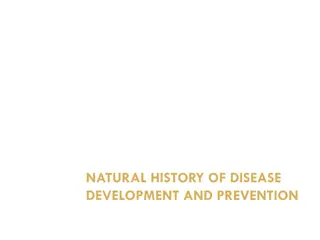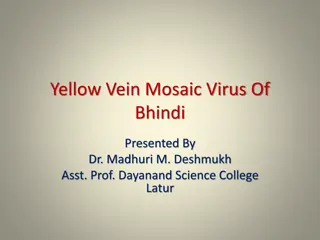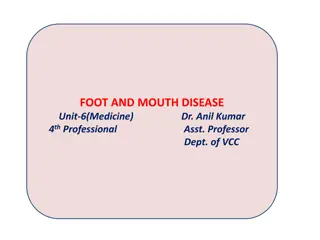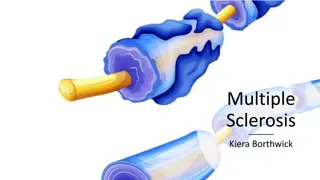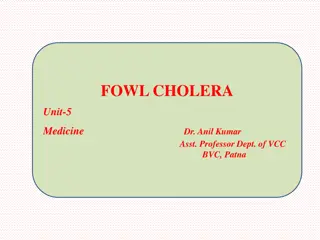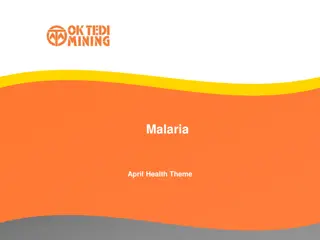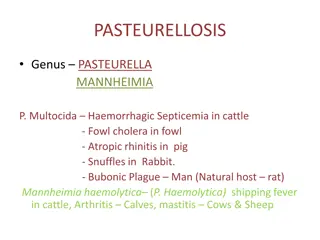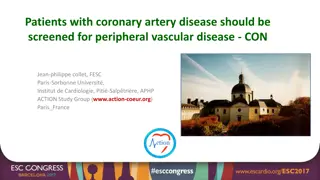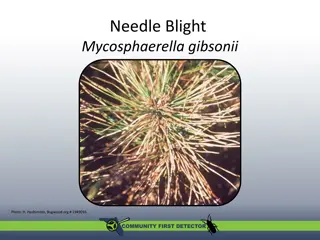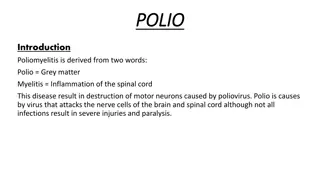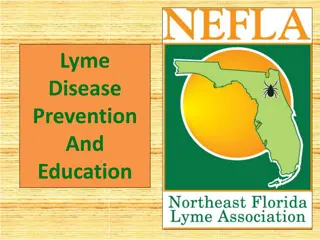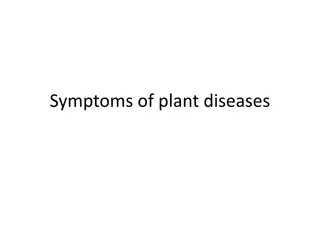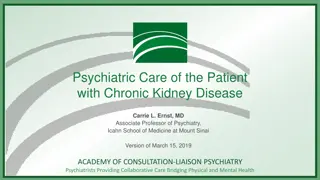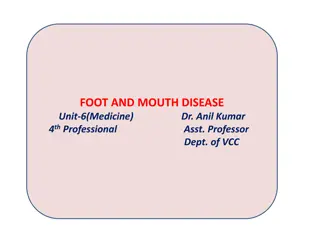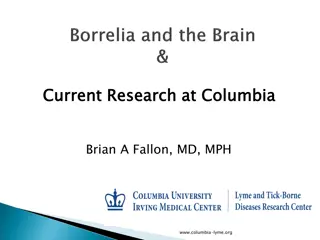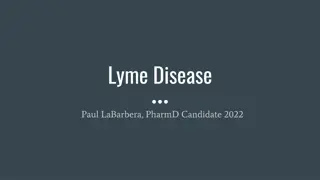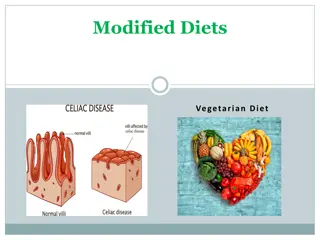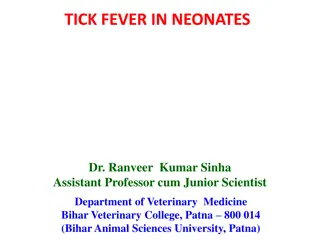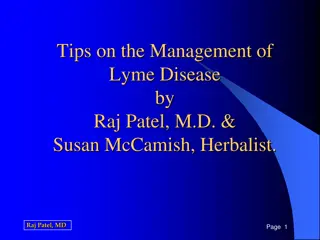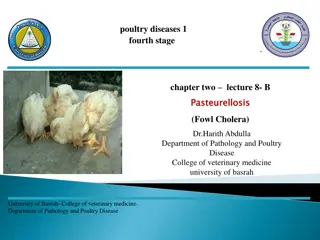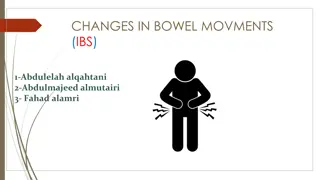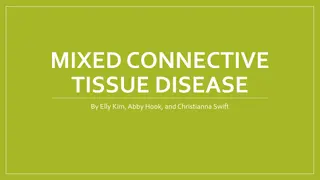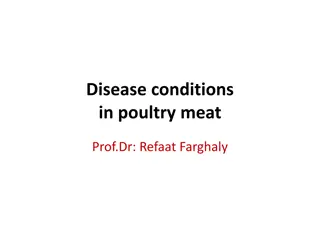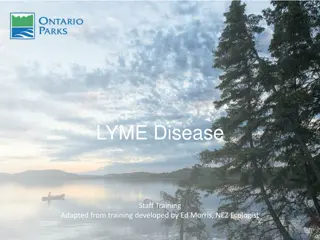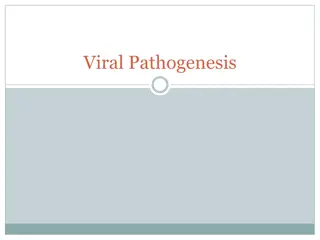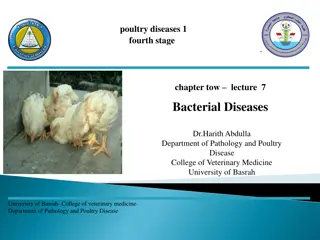One Council Programme The Newcastle Under Lyme Borough Council
The Newcastle Under Lyme Borough Council embarks on a transformative journey with the One Council Programme, focusing on collaborative design, driving change, and establishing design principles for their Future Operating Model (FOM). Pre-launch activities include high-level assessments, benchmarking
0 views • 12 slides
Understanding the Natural History of Disease Development and Prevention
The natural history of disease development outlines the progression of a disease in an individual without intervention, from exposure to outcome. Learning objectives include defining prevention terms, understanding disease severity, prevention levels, and intervention measures. Studying disease prog
4 views • 16 slides
Understanding Graft-Versus-Host Disease (GVHD) and Its Symptoms
Graft-versus-host disease (GVHD) is a potential complication following stem cell or bone marrow transplants, where donor cells attack the recipient's body. GVHD can occur in acute or chronic forms, presenting symptoms such as abdominal issues, skin rash, dryness, joint pain, and more. This autoimmun
0 views • 13 slides
Understanding Yellow Vein Mosaic Virus of Bhindi
Yellow Vein Mosaic Virus of Bhindi, also known as Okra Yellow Vein Mosaic, is a viral disease caused by the Begomovirus, affecting okra plants. The disease manifests through symptoms like vein-clearing and vein-chlorosis of leaves, leading to yellow network patterns on the leaves and stunted, malfor
0 views • 14 slides
Understanding SYNCHYTRIUM: Causes, Symptoms, and Control of Potato Wart Disease
Synchytrium endobioticum causes potato wart disease, prevalent in cool, moist climates globally. The disease affects underground parts, causing dark brown outgrowths on tubers and shoots. Infected tubers become deformed, tasteless, and unfit for consumption. Classification, symptoms, somatic structu
1 views • 20 slides
Foot and Mouth Disease: Overview, Symptoms, and Sequelae
Foot and Mouth Disease, also known as Aphthous fever, is a highly contagious viral infection affecting cloven-hoofed animals. It is characterized by the formation of vesicles and erosions in the mouth, nose, teats, and feet. The disease can cause a fall in milk yield, high fever, loss of appetite, a
1 views • 8 slides
Understanding Bluetongue Disease in Sheep, Cattle, and Goats: Causes, Symptoms, and Diagnosis
Bluetongue disease is a viral illness predominantly affecting sheep, with occasional cases in cattle and goats. Transmitted by insect vectors, it can lead to various symptoms such as catarrhal stomatitis, lameness, and reproductive issues. The disease's impact, transmission methods, clinical signs,
0 views • 8 slides
Understanding Multiple Sclerosis: Symptoms, Progression, and Treatment Options
Explore the cellular processes, symptoms, disease progression, and treatment options associated with Multiple Sclerosis (MS). Discover how MS, an autoimmune disease, affects the nervous system leading to a range of symptoms. Learn about the clinical progression of MS and how the immune system causes
0 views • 12 slides
Annual Coeliac Review Mini Video Series: Symptoms, CDAT, and Support
Discover the annual Coeliac review mini video series that covers topics like symptoms of Coeliac Disease, Calcium and Vitamin D needs, Folic Acid, Vitamin B12, Iron levels, labelling, cross-contamination awareness, and more. Learn about the varied symptoms of Coeliac Disease, the impact on gut villi
0 views • 6 slides
Understanding Fowl Cholera in Birds: Causes, Symptoms, and Management
Fowl cholera, a septicaemic disease affecting birds, is caused by Pasteurella multocida. It can affect all species of birds, with older birds more susceptible. The disease can spread through carrier birds, excretions, carcasses, and even rats. The virulence factors, clinical signs, and forms of the
2 views • 9 slides
Understanding Malaria: Causes, Symptoms, and Prevention
Malaria is an infectious disease caused by the Plasmodium parasite, transmitted through the bite of a female Anopheles mosquito. There are four types of Plasmodium parasites, with Plasmodium falciparum being the most severe. Malaria incidence globally has seen millions of cases with significant mort
9 views • 14 slides
Understanding Pasteurellosis: A Bacterial Disease in Livestock
Pasteurellosis, caused by organisms like Pasteurella and Mannheimia, affects various animals including cattle, fowl, pigs, and rabbits. The disease presents as haemorrhagic septicaemia in cattle, with symptoms like high fever and respiratory distress. It is an important bacterial disease in livestoc
0 views • 30 slides
Advanced Herbal Approaches for Gastro-Intestinal Lyme Disease Treatment
Unveil the symptoms, stealth pathogenic gut infections, differentiation from typical GI diseases, causes of GI disorders, and post-natal Qi tonification in addressing Gastrointestinal Lyme Disease using advanced herbal studies. Learn to differentiate infectious GI diseases, identify potential causes
0 views • 38 slides
Screening for Peripheral Vascular Disease in Patients with Coronary Artery Disease
Patients with coronary artery disease should be screened for peripheral vascular disease as it is a frequent integrator of global cardiovascular risk. The association of atherosclerosis in various arterial diseases highlights the importance of identifying multisite artery disease. The prevalence and
0 views • 23 slides
Needle Blight Mycosphaerella Gibsonii: Symptoms, Host Plants, and Management
Needle blight caused by the fungal pathogen Mycosphaerella gibsonii is a serious disease affecting various species of Pinus trees. The disease, first recorded in Japan in 1913, primarily impacts seedlings and saplings, leading to significant infection rates and death rates under epidemic conditions.
0 views • 21 slides
Understanding Poliomyelitis: Causes, Symptoms, and Prevention
Poliomyelitis, commonly known as polio, is an infectious viral disease caused by the poliovirus. It primarily affects young children, leading to the destruction of motor neurons. The disease can manifest with varying symptoms, ranging from mild flu-like symptoms to severe paralysis. Poliovirus is tr
0 views • 12 slides
Human Disease Symptom Network: Understanding Disease Relationships Through Symptoms and Genes
The Human Disease Symptom Network (HSDN) is constructed using a large-scale medical bibliographic records database to form a network of human diseases based on symptom similarities. By integrating disease-gene associations and protein-protein interaction data, correlations between symptom similarity
0 views • 37 slides
Comprehensive Guide to Lyme Disease: Prevention, Transmission, Symptoms, and Treatment
Lyme disease, caused by the Borrelia burgdorferi bacterium transmitted through tick bites, can lead to various symptoms if left untreated. Learn about prevention methods, how to handle tick bites, recognize symptoms, and understand the challenges in testing and treating acute and chronic Lyme diseas
0 views • 14 slides
Understanding Plant Diseases: Symptoms and Identification
Plant diseases induce reactions in host plants, leading to visible abnormalities known as symptoms. Common symptoms include mildew, rusts, smuts, white blisters, and blotches. Each type of disease manifests differently, such as powdery growth in mildew and pustules in rusts. Proper identification of
0 views • 171 slides
Psychiatric Care of Patients with Chronic Kidney Disease
This resource delves into the psychiatric care aspects of patients with chronic kidney disease (CKD), detailing symptoms, staging, common psychiatric disorders, pharmacokinetic changes, and renal adverse effects of psychotropic medications. It also presents facts about CKD prevalence in the US, stag
0 views • 26 slides
Understanding the Complexities of Lyme Disease
Lyme disease, caused by the spirochete Borrelia burgdorferi, presents unique challenges due to the bacteria's ability to evade the immune system, slow reproduction rate, and lack of classic bacterial weaponry. Unlike other bacterial diseases, Lyme may not always exhibit clear symptoms, has varying t
0 views • 11 slides
Understanding Foot and Mouth Disease in Animals: Causes, Symptoms, and Management
Foot and Mouth Disease is an acute, highly contagious illness affecting cloven-hoofed animals, causing vesicles and erosions in the mouth, nose, teats, and feet. The disease is caused by a positive sense, ss-RNA virus with various serotypes. Transmission occurs through inhalation, direct or indirect
0 views • 8 slides
Understanding Foot-and-Mouth Disease (FMD) and Bovine Viral Diarrhea (BVD)
Foot-and-mouth disease (FMD) is a highly contagious animal disease affecting cloven-hoofed animals, while Bovine Viral Diarrhea (BVD) is a serious cattle disease caused by the BVD virus. FMD is not transmissible to humans and is caused by different strains of Aphthovirus. Symptoms of FMD include ves
0 views • 12 slides
Neurological Complications of Lyme Disease: Symptoms and Markers
In patients with Lyme disease, various neurological complications can arise, including inflammation of brain tissues, cranial nerves, and membranes around the brain. Symptoms range from headaches and neck stiffness to cognitive changes, mood swings, and sensory numbness. Specific markers, such as el
0 views • 24 slides
Understanding Lyme Disease: Symptoms, Diagnosis, and Treatment Options
Lyme disease is an infectious inflammatory disease caused by Borrelia burgdorferi and spread by tick bites. It presents with a range of symptoms, including fever, headache, fatigue, and a characteristic erythema migrans rash. Prompt diagnosis and treatment are essential to prevent complications such
0 views • 16 slides
Understanding Coeliac Disease and Modified Diets for a Healthier Lifestyle
Coeliac disease is an autoimmune condition that affects the body's ability to process gluten, leading to various symptoms like abdominal pain, fatigue, and nutrient deficiencies. Following a modified diet, such as a vegetarian or gluten-free diet, can help manage these symptoms and promote better he
0 views • 17 slides
Summer Sufferings: Treatment Options for Hay Fever and Related Conditions
Dr. Craig Masson, a GP in Clarkston, East Renfrewshire, discusses prescribing and non-prescribing options for hay fever, sinusitis, prickly heat, urticaria, and Lyme disease. The content covers the challenges of managing hay fever symptoms including grass and pollen allergies, and suggests non-pharm
0 views • 24 slides
Understanding Tick Fever in Neonates: Symptoms, Diagnosis, Treatment, and Prevention
Tick fever in neonates is a febrile disease transmitted by tick bites, with symptoms including fever, loss of appetite, depression, weakness, red urine, anemia, and jaundice. The disease can be diagnosed through clinical symptoms, tick presence, and blood smear examination. Treatment involves medica
0 views • 9 slides
Understanding Lyme Disease: Risks, Symptoms, and Prevention
Tick-borne diseases, particularly Lyme Disease, pose a significant health concern in the United States. Learn about the various diseases transmitted by infected ticks, the rise in Lyme Disease cases, who is at risk, and the symptoms to watch out for. Discover the basics of Lyme Disease, including it
0 views • 44 slides
Comprehensive Management Tips for Lyme Disease by Raj Patel, M.D. & Susan McCamish, Herbalist
Raj Patel, M.D., along with herbalist Susan McCamish, provides valuable insights on Lyme disease management. The presentation covers aspects such as Jarisch-Herxheimer Reaction, prevalence, symptoms, treatment protocols, and immune response variability. Dr. Patel emphasizes assessing, supporting key
0 views • 48 slides
Understanding Heart Disease: Causes, Symptoms, and Common Conditions
Heart disease, a prevalent health issue in the United States, encompasses various cardiovascular conditions like coronary artery disease and hypertension. It is a leading cause of death, often resulting from conditions that can lead to heart attacks or failure. Symptoms of heart conditions vary, fro
0 views • 28 slides
Understanding Chronic Heart Failure: Causes, Symptoms, and Treatment
Chronic heart failure is a serious condition caused by various factors such as coronary artery disease, hypertension, and cardiomyopathy. It involves both left-sided and right-sided symptoms, impacting quality of life and survival. Treatment aims to manage symptoms, slow disease progression, and imp
0 views • 37 slides
Understanding Vaginal Symptoms in Menopause and Barriers to Treatment
The article discusses the various symptoms associated with the Genitourinary Syndrome of Menopause (GSM) such as decreased vaginal moisture, urinary frequency, and sexual difficulties. It highlights the prevalence of these symptoms in women and the barriers to seeking treatment, including discomfort
1 views • 7 slides
Understanding Pasteurellosis (Fowl Cholera) in Poultry: Causes, Symptoms, and Management
Pasteurellosis, also known as Fowl Cholera, is an acute septicemic disease affecting domestic fowl and wild birds caused by Pasteurella multocida. This disease is characterized by high morbidity and mortality rates, primarily impacting chickens, turkeys, and ducks. The disease spreads through health
0 views • 10 slides
Understanding Irritable Bowel Syndrome: Symptoms, Diagnosis, and Management
Define constipation and diarrhea, discuss the definition, etiology, and classification of IBS, explain how to diagnose IBS, list alarm symptoms and differential diagnosis, provide a management plan and follow-up, and recognize when to refer to a specialist. People with irritable bowel syndrome may s
0 views • 35 slides
Understanding Mixed Connective Tissue Disease (MCTD)
Mixed connective tissue disease (MCTD), also known as Sharp's syndrome, is a rare inflammatory rheumatic disease diagnosed through clinical evaluation, patient history, or special blood tests. Symptoms include overlapping connective tissue disease symptoms, with main cause being autoimmunity. It can
0 views • 7 slides
Disease Conditions in Poultry Meat: Causes, Symptoms, and Lesions
This detailed information by Prof. Dr. Refaat Farghaly discusses various disease conditions in poultry meat, including bacterial, viral, parasitic, and protozoal diseases. It covers diseases such as tuberculosis, fowl cholera, marek's disease, salmonellosis, and coccidiosis, providing insights into
0 views • 28 slides
Lyme Disease Awareness and Prevention Training
Learn about Lyme disease spread by blacklegged ticks, tick life cycle stages, and how to avoid tick bites. Discover tips for checking and removing ticks effectively to prevent infection. Stay informed and take necessary precautions to reduce the risk of Lyme disease transmission.
0 views • 10 slides
Understanding Viral Pathogenesis: Causes and Consequences
Viral pathogenesis involves the process by which a virus leads to disease, exploring the interplay between viral and host factors. It encompasses the concepts of virulence, viral disease, and the effects on infected cells and the host's immune response. Changes within infected cells, including cell
0 views • 26 slides
Understanding Avian Salmonellosis in Poultry: Causes, Symptoms, and Prevention
Avian Salmonellosis, a bacterial disease in poultry, is categorized into distinct forms such as Pullorum Disease, Fowl Typhoid, and Paratyphoid Infection. It is characterized by high mortality rates, affecting both young chicks and mature fowls. The disease spreads through infected eggs, leading to
0 views • 11 slides

